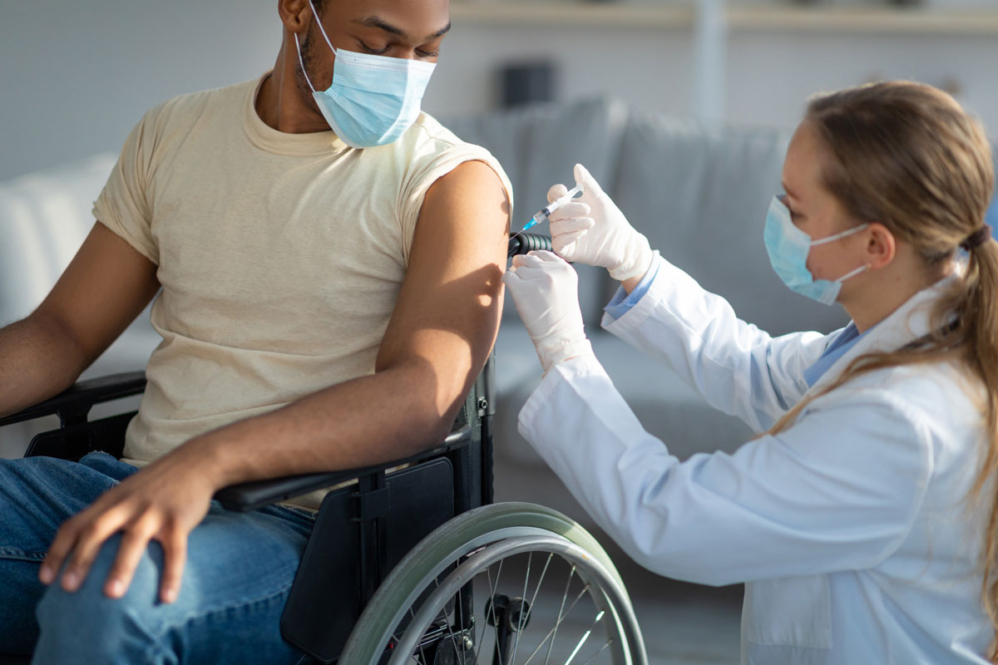COVID-19 Vaccines for Moderately to Severely Immunocompromised People
COVID-19 Vaccines for Moderately to Severely Immunocompromised People
From Centers for Disease Control and Prevention
cdc.gov/coronavirus/2019-ncov/vaccines/recommendations/immuno.html
NOTICE: FDA has granted full approval for Pfizer-BioNTech (COMIRNATY) COVID-19 Vaccine. CDC’s Advisory Committee on Immunization Practices is meeting on Monday, August 30, 2021, to discuss its updated recommendation for this vaccine.
What You Need to Know
- People who are moderately to severely immunocompromised are especially vulnerable to COVID-19 because they are more at risk of serious, prolonged illness.
- People with moderately to severely compromised immune systems may not build the same level of immunity to 2-dose vaccine series compared to people who are not immunocompromised.
- People who have compromised immune systems may benefit from an additional dose to make sure they have enough protection against COVID-19.
- CDC recommends people who are moderately to severely immunocompromised should receive an additional dose of mRNA COVID-1 vaccine after the initial 2 doses.
- This additional dose intended to improve immunocompromised people’s response to their initial vaccine series is not the same as a booster dose, given to people when the immune response to a primary vaccine series is likely to have waned over time.
- Although CDC does not recommend additional doses or booster for any other population at this time, HHS has announced a plan to begin offering COVID-19 vaccine booster shots this fall. CDC’s independent advisory committee, the Advisory Committee on Immunization Practices, will continue to meet and discuss data on the evolution of the pandemic and the use of COVID-1 vaccines. ACIP will make further recommendations on the use of boosters for the public after a thorough review of the evidence.
- CDC recommends that people with moderately to severely compromised immune systems receive an additional dose of mRNA COVID-19 vaccine at least 28 days after a second dose of Pfizer-BioNTech COVID-19 vaccine or Moderna COVID-19 vaccine.
Data on Decreased Immune Response Among Immunocompromised People
People who are moderately to severely immunocompromised make up about 3% of the adult population and are especially vulnerable to COVID-19 because they are more at risk of serious, prolonged illness.
Studies indicate some immunocompromised people don’t always build the same level of immunity after vaccination the way non-immunocompromised people do, and may benefit from an additional dose to ensure adequate protection against COVID-19. In small studies, fully vaccinated immunocompromised people have accounted for a large proportion of hospitalized “breakthrough cases,” and that suggests immunocompromised people are more likely to transmit the virus to household contacts.
Who Needs an Additional COVID-19 Vaccine?
Currently, CDC is recommending that moderately to severely immunocompromised people receive an additional dose. This includes people who have:
- Been receiving active cancer treatment for tumors or cancers of the blood
- Received an organ transplant and are taking medicine to suppress the immune system
- Received a stem cell transplant within the last 2 years or are taking medicine to suppress the immune system
- Moderate or severe primary immunodeficiency (such as DiGeorge syndrome, Wiskott-Aldrich syndrome)
- Advanced or untreated HIV infection
- Active treatment with high-dose corticosteroids or other drugs that may suppress your immune response
People should talk to their healthcare provider about their medical condition, and whether getting an additional dose is appropriate for them.
For more information, visit cdc.gov/coronavirus/2019-ncov/vaccines/recommendations/immuno.html
If you need information on getting a vaccine or vaccine safety, please call CORD at 508-775-8300. We can help.

